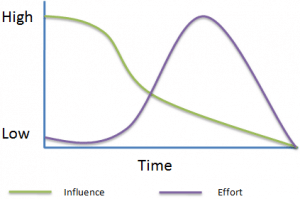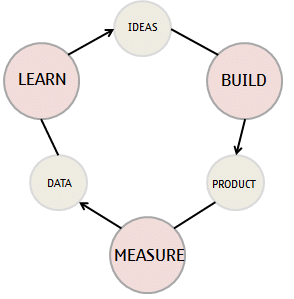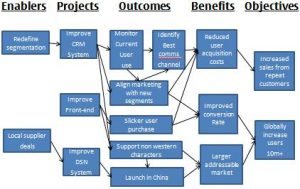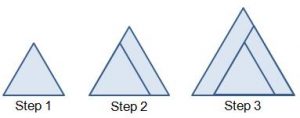Hyperbolic Discounting is a concept from the field of behavioral economics that relates to our preferences as humans and thus is worth understanding from the point of view of the people side of project management and program management.
Hyperbolic discounting basically says that as humans we have a tendency to prefer a smaller reward now rather than the bigger payoff later. We disregard future rewards when it means sacrifices in the present. The reason behind this behaviour is because we are human with a limited life span, and our survival instinct tells us that we won’t be able to enjoy a saved resource tomorrow if we don’t first survive today. This tendency or bias may be one of the reasons why in today’s society many of us make choices resulting in short-term happiness but long-term personal misery.
Let’s look at the most classic example of hyperbolic discounting to make this more real. Suppose I gave you a choice between $50 today and $100 tomorrow. Which would you choose? Statistically, most people would choose to have the $100 tomorrow – they see that by waiting just one extra day they can effectively double their money. However, as the gap between the two offers increases, then the perceived value/importance of the extra $50 falls away rapidly, even though the actual value remains the same ($50).
As an example, if I now said to you that you could have the $50 today or the $100 one year from now, would you still opt for the $100? If you answered yes then you’re amongst the minority as statistically most people would opt for the $50. The pattern of discounting follows a hyperbola (rather than an “exponential” curve which would give us consistent decisions over time), so the further away the initial reward the less severe the discounting of the second reward. This means that given the choice of $50 in 5 years vs. $100 in 6 years, most people will now opt for the $100 again.
It is this rapid undervaluation of the future upon which the entire credit-card industry is based. People borrow money today for immediate benefit (they can buy something) without thinking too much about the future cost (they will have to pay back substantially more than they borrowed).
This rapid depreciation (or undervaluation) of the future is something which is not rational, yet as humans we all have a tendency towards it. In the context of business or program management, it is this innate irrational flaw which causes people to over-commit to future plans. Time and time again people within organizations and businesses will make future commitments that are far off, that they wouldn’t dream of making if that commitment demanded that they take immediate action towards it.
Despite the fact that hyperbolic discounting is an innate flaw in humans, for us project managers and program managers, not all is lost. Firstly, by simply understanding the phenomena of hyperbolic discounting we become more aware of any commitments for the future that we or our peers are making. Secondly, we might seek the advice of a objective third-party when faced with such a decision (project office anyone?). By tracking how we have delivered against previous commitments and promises the project office can provide a sanity check for any commitments we might be tempted to make.
Make hay whilst the sun shines!







